What is Public IP Address and the Role of VPNs
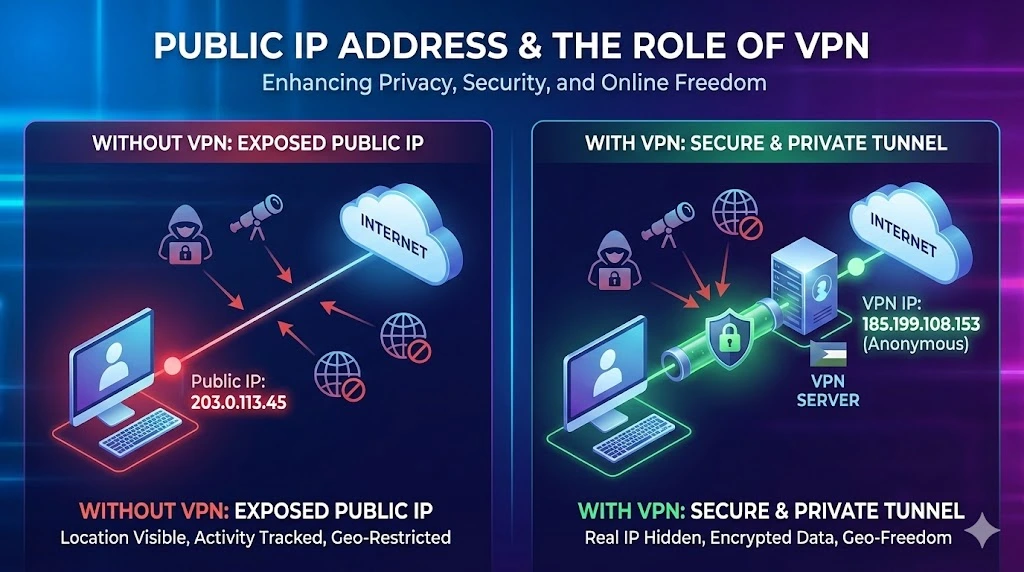
Public IP addresses are unique identifiers assigned to devices connected to the internet, enabling them to communicate with other devices globally. These addresses are essential for the functioning of the internet, enabling the routing of data between different networks and ensuring that information reaches the correct destination. However, the visibility and accessibility of public IP addresses also pose certain privacy and security risks. This is where Virtual Private Networks (VPNs) come into play.
Table of Contents
What is a VPN?
A VPN, or Virtual Private Network, is a service that creates a secure, encrypted connection between your device and a remote server operated by the VPN provider. By routing your internet traffic through this server, a VPN masks your real public IP address and assigns you a new one, typically from a different location. This process enhances privacy and security while also providing other benefits.
How VPNs Work with Public IP Addresses
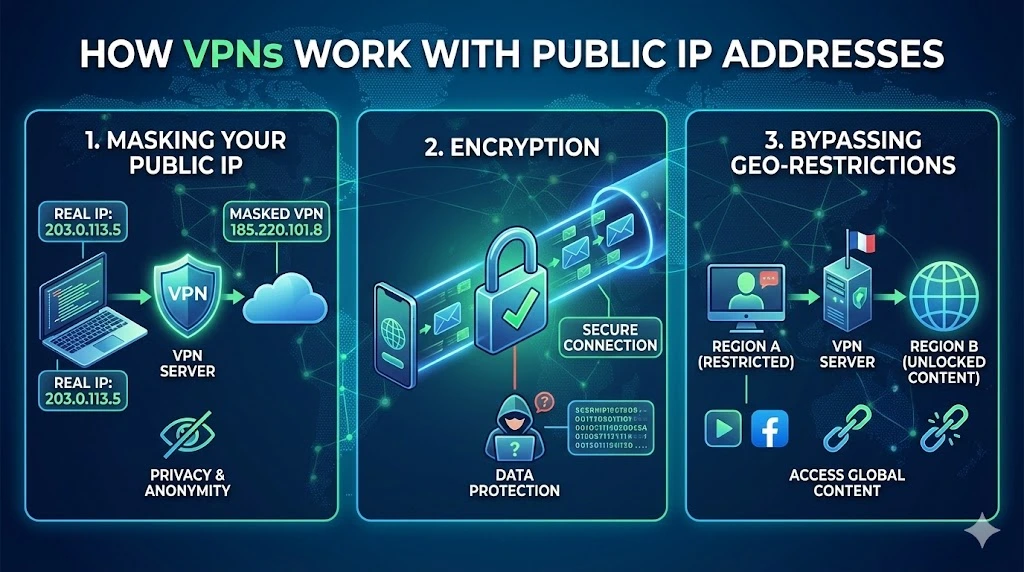
1. Masking Your Public IP Address
Privacy: By masking your real public IP address, a VPN helps protect your identity and location from websites, advertisers, and potential cyber attackers. Your internet activity appears to originate from the VPN server rather than your actual device.
Anonymity: This masking process makes it more difficult for third parties to track your online activities, offering a layer of anonymity.
2. Encryption
Secure Connection: VPNs encrypt your internet traffic, making it unreadable to anyone who might intercept it, such as hackers or even your ISP. This is particularly important when using public Wi-Fi networks.
Data Protection: Encryption ensures that sensitive data, such as login credentials, banking information, and personal details, remain secure.
3. Bypassing Geographical Restrictions
Access Content: VPNs can assign you an IP address from a different country, allowing you to access content that may be restricted in your region, such as streaming services, websites, or social media platforms.
Avoid Censorship: In regions with strict internet censorship, VPNs enable users to access a free and open internet by bypassing governmental restrictions.
4 Benefits of Using a VPN with Public IP Addresses
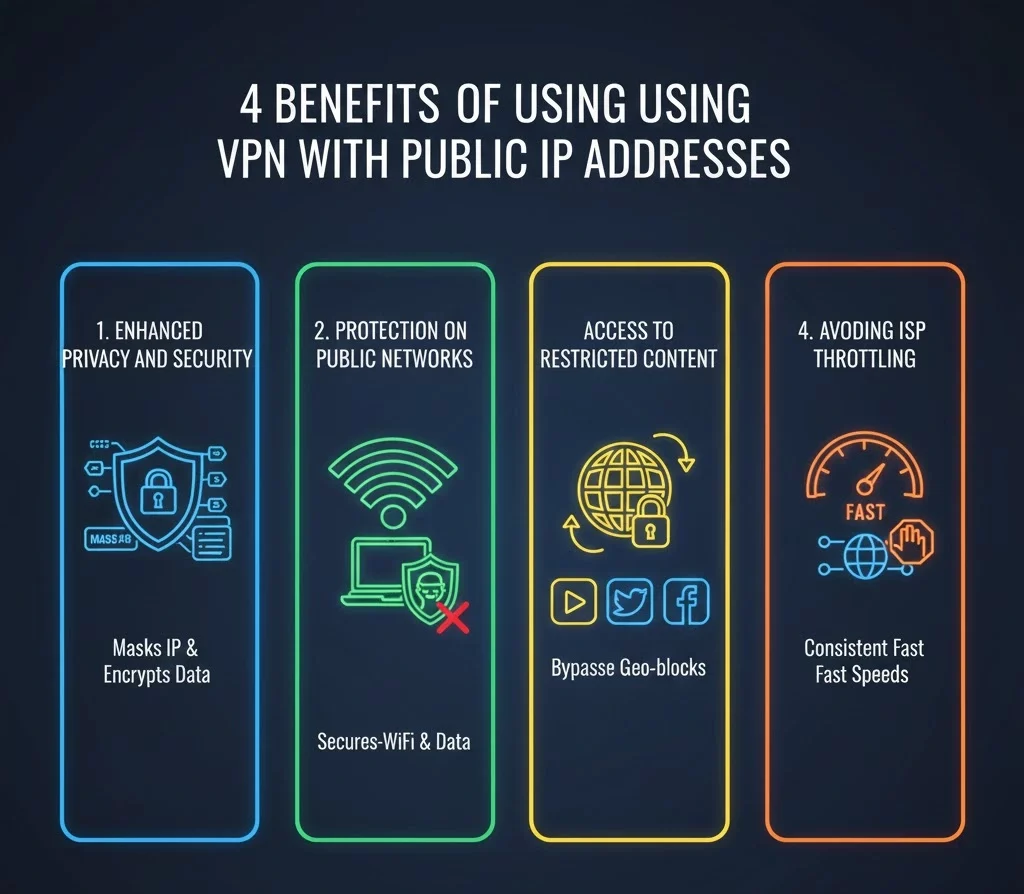
1. Enhanced Privacy and Security
Using a VPN masks your public IP address and encrypts your data, significantly enhancing your online privacy and security. This is especially beneficial when accessing sensitive information or conducting monetary transactions online.
2. Protection of Public Networks
Public Wi-Fi networks are often unsecured and vulnerable to attacks. A VPN secures your connection, protecting your data from potential eavesdroppers and hackers.
3. Access to Restricted Content
VPNs allow you to access content that may be blocked or restricted based on your geographical location, providing a more open and unrestricted internet experience.
4. Avoiding ISP Throttling
Some ISPs throttle internet speeds based on usage patterns or specific activities. A VPN can help prevent this throttling by masking your activities, ensuring a faster and more consistent internet connection.
Conclusion
Public IP addresses are crucial for internet connectivity but can expose users to privacy and security risks. VPNs address these concerns by masking your public IP address and encrypting your internet traffic, enhancing online privacy and security. They also enable access to restricted content and protect your data on public networks, making them a valuable tool for a safer and more private internet experience.
Looking for reliable and cost-effective IP address solutions? Look no further than Larus. Whether you need to buy, rent, or lease IP addresses, Larus offers an extensive inventory of IPv4 address blocks to meet your needs.
With a commitment to transparency, efficiency, and expert guidance, Larus.net ensures a seamless process that aligns with your specific goals. Join businesses worldwide that trust Larus.net for their IP address needs. Visit Larus.net today to secure the IP resources essential for your online presence and growth.
Trusted IPv4 Leasing for Business Growth
Get enterprise-grade IPv4 space quickly, with seamless deployment and end-to-end management.
Get Started with i.leaseFAQs
Does a VPN change my Public IP or Private IP?
A VPN changes your Public IP address (the one visible to the internet). Your Private IP address (the one assigned by your router to your device, like 192.168.1.5) remains the same on your local network, but it is not visible to the outside world anyway.
Can my ISP see my Public IP address if I use a VPN?
Your ISP can see that you are connected to a VPN server’s IP address, but they cannot see the final website you are visiting or the data you are transmitting. The VPN creates an encrypted tunnel, effectively blinding your ISP to your specific online activities.
Is a Proxy the same as a VPN?
No. A Proxy only hides your IP address for a specific app (like your web browser) but does not encrypt your traffic. A VPN encrypts all the internet traffic leaving your device, providing much stronger security and privacy than a simple proxy.
Related Posts
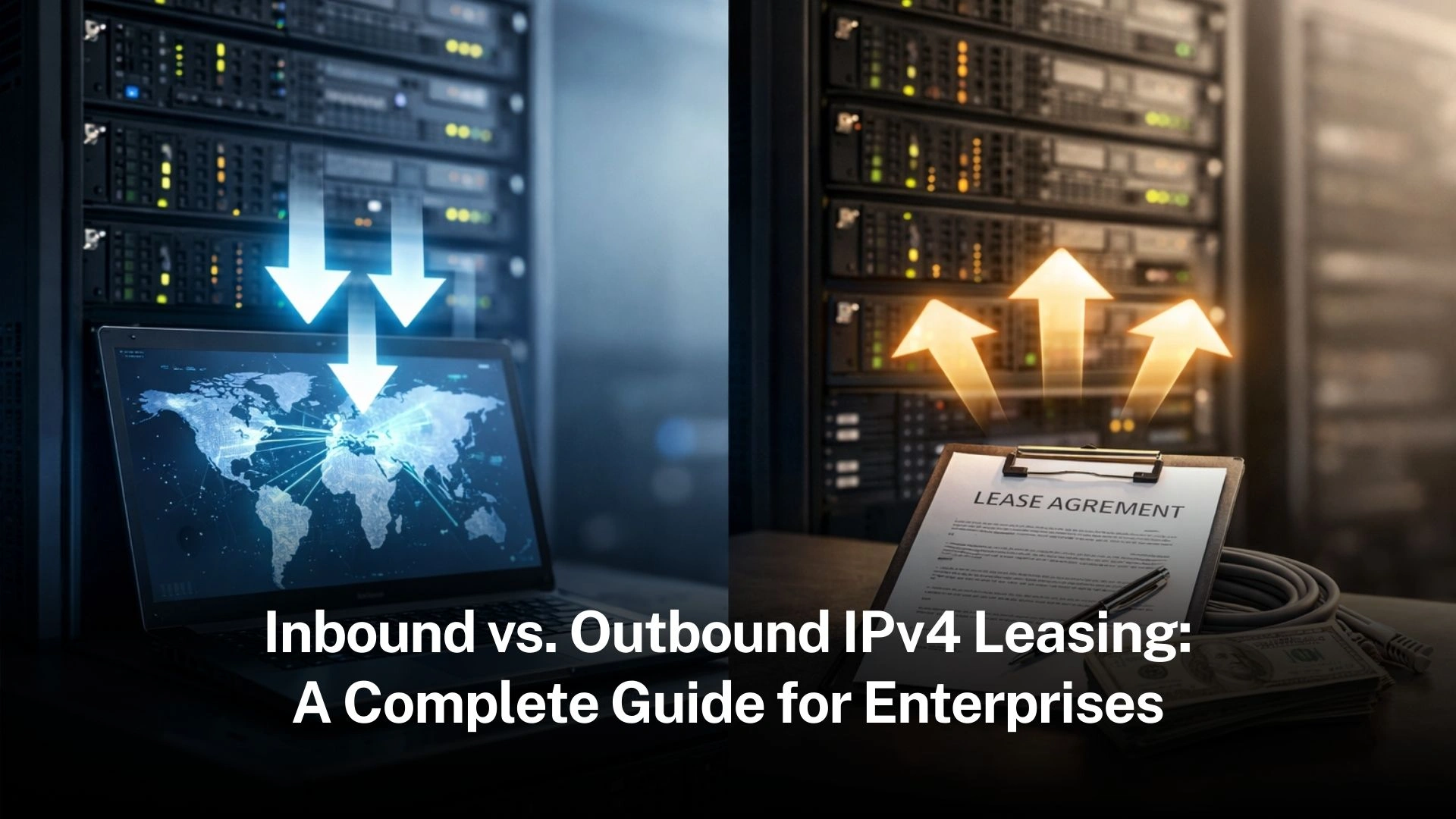
Inbound vs. Outbound IPv4 Leasing: A Complete Guide for Enterprises
Understanding IPv4 leasing helps enterprises manage scarce address space, reducing risk and unlocking strategic growth opportunities in today’s digital economy. Key points Distinguishes between inbound (leasing in) and outbound (leasing out) IPv4 approaches and their strategic implications. Highlights contract structures, registry risk management and continuity considerations affecting global number resources. Inbound vs. outbound IPv4 leasing: complete enterprise guide In the post-exhaustion era of Internet Protocol version 4 (IPv4),Read more Related Posts Inbound vs. Outbound IPv4 Leasing: A Complete Guide for Enterprises Understanding IPv4 leasing helps enterprises manage scarce address space, reducing risk and unlocking strategic growth opportunities in today’s digital economy. Key Read more Common Myths About Selling IP Addresses The IPv4 secondary market is often shrouded in mystery, leading many organizations to sit on valuable digital assets because they Read more How to turn idle IPv4 addresses into a recurring revenue stream with iLease Unlock the hidden value of unused IPv4 addresses with iLease, turning dormant digital infrastructure into a recurring revenue stream while Read more .related-post {} .related-post .post-list { text-align: left; } .related-post .post-list .item { margin: 5px; padding: 10px; } .related-post .headline { font-size: 18px !important; color: #999999 !important; } .related-post .post-list .item .post_thumb { max-height: 220px; margin: 10px 0px; padding: 0px; display: block; } .related-post .post-list .item .post_title { font-size: 16px; color: #3f3f3f; margin: 10px 0px; padding: 0px; display: block; text-decoration: none; } .related-post .post-list .item .post_excerpt { font-size: 13px; color: #3f3f3f; margin: 10px 0px; padding: 0px; display: block; text-decoration: none; } @media only screen and (min-width: 1024px) { .related-post .post-list .item { width: 30%; } } @media only screen and (min-width: 768px) and (max-width: 1023px) { .related-post .post-list .item { width: 90%; } } @media only screen and (min-width: 0px) and (max-width: 767px) { .related-post .post-list .item { width: 90%; } }
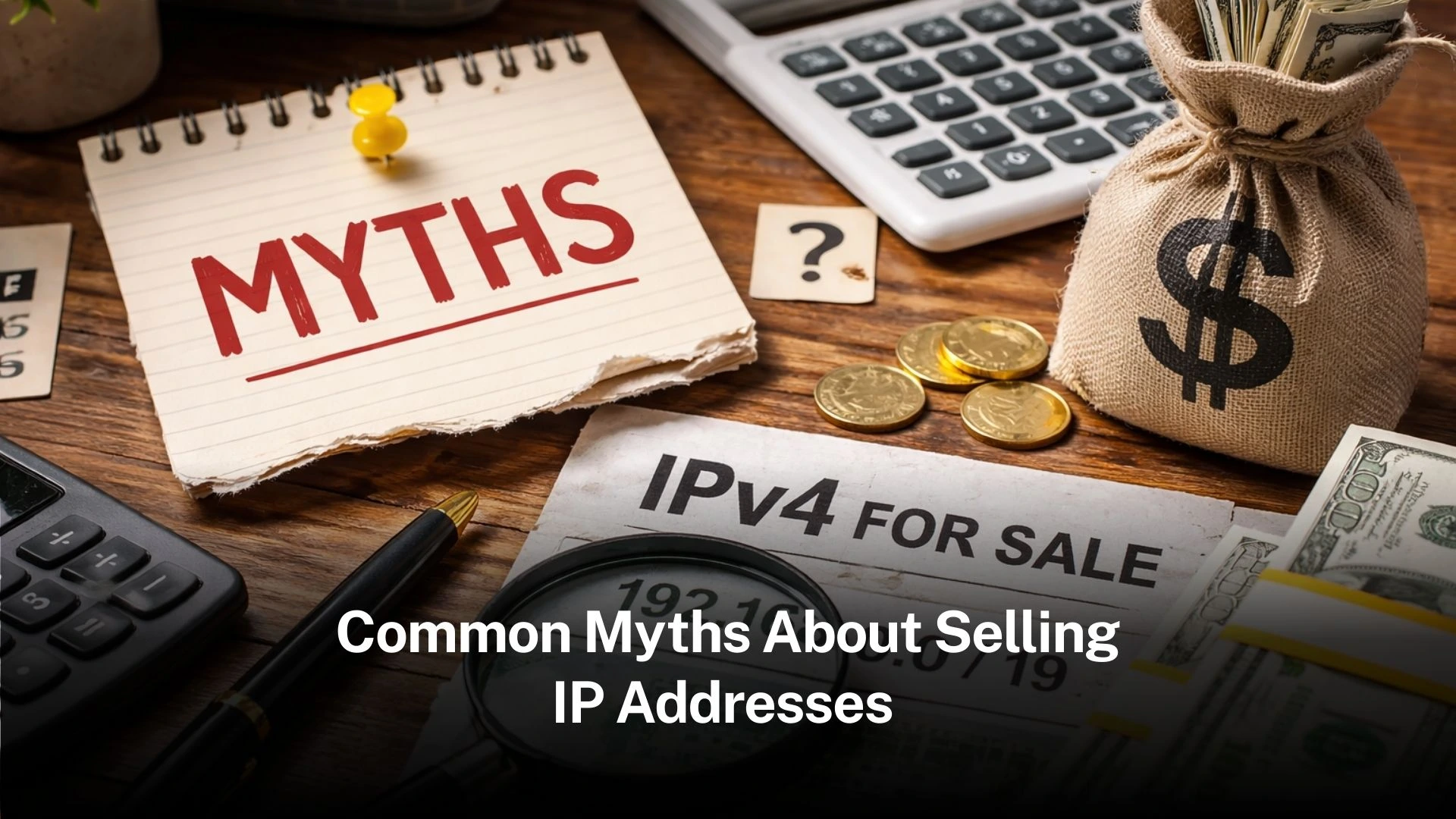
Common Myths About Selling IP Addresses
The IPv4 secondary market is often shrouded in mystery, leading many organizations to sit on valuable digital assets because they fear the perceived complexity or legal “gray areas.” As IPv4 exhaustion becomes a permanent reality, the value of these addresses has skyrocketed, yet misconceptions continue to stall potential transactions. At i.lease, powered by the real-world expertise of LARUS, we’ve seen how these myths prevent companies from unlocking significant capital.Read more Related Posts Inbound vs. Outbound IPv4 Leasing: A Complete Guide for Enterprises Understanding IPv4 leasing helps enterprises manage scarce address space, reducing risk and unlocking strategic growth opportunities in today’s digital economy. Key Read more Common Myths About Selling IP Addresses The IPv4 secondary market is often shrouded in mystery, leading many organizations to sit on valuable digital assets because they Read more How to turn idle IPv4 addresses into a recurring revenue stream with iLease Unlock the hidden value of unused IPv4 addresses with iLease, turning dormant digital infrastructure into a recurring revenue stream while Read more .related-post {} .related-post .post-list { text-align: left; } .related-post .post-list .item { margin: 5px; padding: 10px; } .related-post .headline { font-size: 18px !important; color: #999999 !important; } .related-post .post-list .item .post_thumb { max-height: 220px; margin: 10px 0px; padding: 0px; display: block; } .related-post .post-list .item .post_title { font-size: 16px; color: #3f3f3f; margin: 10px 0px; padding: 0px; display: block; text-decoration: none; } .related-post .post-list .item .post_excerpt { font-size: 13px; color: #3f3f3f; margin: 10px 0px; padding: 0px; display: block; text-decoration: none; } @media only screen and (min-width: 1024px) { .related-post .post-list .item { width: 30%; } } @media only screen and (min-width: 768px) and (max-width: 1023px) { .related-post .post-list .item { width: 90%; } } @media only screen and (min-width: 0px) and (max-width: 767px) { .related-post .post-list .item { width: 90%; } }
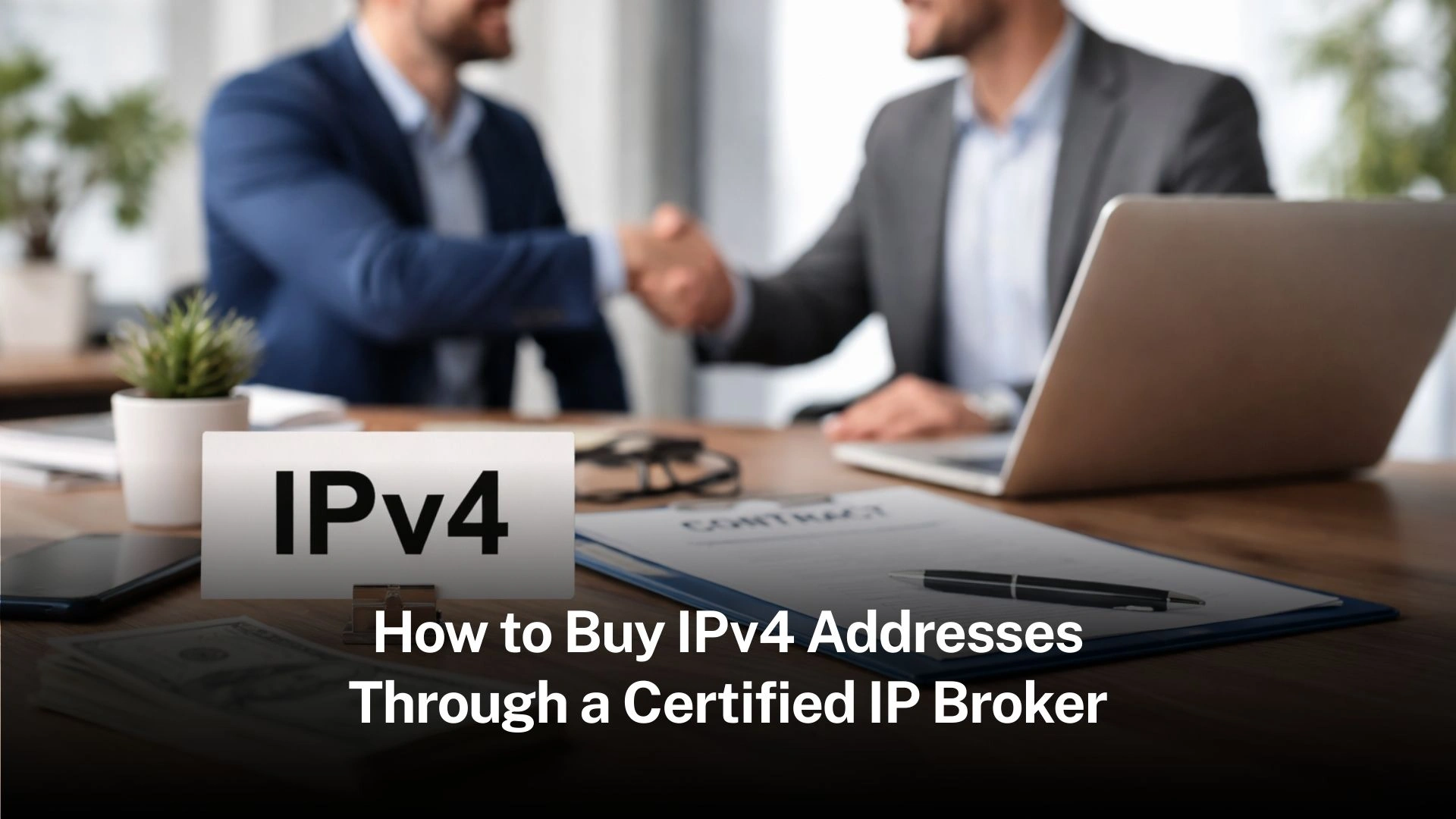
How to buy IPv4 addresses through a certified IP broker
Buying IPv4 space requires policy compliance, verified need, and registry approval, making certified IP brokers essential guides through complex global transfers. IPv4 transactions are regulated transfers, not simple purchases — registries must approve documentation, justification and registration changes. Certified brokers reduce risk and delay by aligning buyers with registry policy, routing legitimacy and cross-region requirements. Why companies still need to buy IPv4 addresses The global supply of IPv4 addressesRead more Related Posts Inbound vs. Outbound IPv4 Leasing: A Complete Guide for Enterprises Understanding IPv4 leasing helps enterprises manage scarce address space, reducing risk and unlocking strategic growth opportunities in today’s digital economy. Key Read more Common Myths About Selling IP Addresses The IPv4 secondary market is often shrouded in mystery, leading many organizations to sit on valuable digital assets because they Read more How to turn idle IPv4 addresses into a recurring revenue stream with iLease Unlock the hidden value of unused IPv4 addresses with iLease, turning dormant digital infrastructure into a recurring revenue stream while Read more .related-post {} .related-post .post-list { text-align: left; } .related-post .post-list .item { margin: 5px; padding: 10px; } .related-post .headline { font-size: 18px !important; color: #999999 !important; } .related-post .post-list .item .post_thumb { max-height: 220px; margin: 10px 0px; padding: 0px; display: block; } .related-post .post-list .item .post_title { font-size: 16px; color: #3f3f3f; margin: 10px 0px; padding: 0px; display: block; text-decoration: none; } .related-post .post-list .item .post_excerpt { font-size: 13px; color: #3f3f3f; margin: 10px 0px; padding: 0px; display: block; text-decoration: none; } @media only screen and (min-width: 1024px) { .related-post .post-list .item { width: 30%; } } @media only screen and (min-width: 768px) and (max-width: 1023px) { .related-post .post-list .item { width: 90%; } } @media only screen and (min-width: 0px) and (max-width: 767px) { .related-post .post-list .item { width: 90%; } }